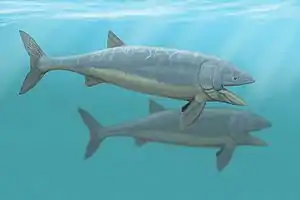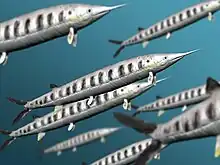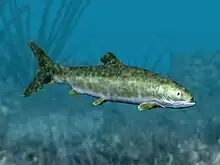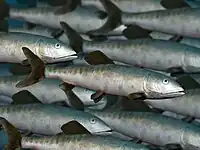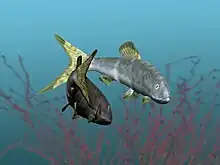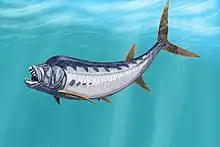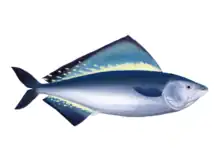| Belonostomus Temporal range: | |
|---|---|
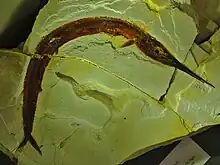 | |
| Belonostomus kochii | |
| Scientific classification | |
| Domain: | Eukaryota |
| Kingdom: | Animalia |
| Phylum: | Chordata |
| Class: | Actinopterygii |
| Order: | †Aspidorhynchiformes |
| Family: | †Aspidorhynchidae |
| Genus: | †Belonostomus Agassiz, 1834 |
| Synonyms | |
|
Diphyodus | |
Belonostomus (from Greek: βέλος belos, 'dart' and Greek: στόμα stóma 'mouth')[1] is a genus of prehistoric ray-finned fish that was described by Louis Agassiz in 1844. It is a member of the order Aspidorhynchiformes, a group of fish known for their distinctive elongated rostrums. The oldest known species are from the Upper Jurassic of Germany, with the youngest known species from the late Paleocene. Fossils of Belonostmus have been found worldwide in marine deposits. It likely consumed plankton or other small fish,[2] though one specimen from the Late Jurassic of Germany was found with the lizard-like reptile Homoeosaurus as stomach contents.[3]
Belonostomus species include:
- Belonostomus kochii
- Belonostomus acutus
- Belonostomus carinatus
- Belonostomus crassirostris
- Belonostomus indicus
- Belonostomus longirostris
- Belonostomus münsteri
- Belonostomus tenuirostris
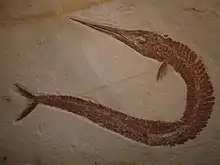
†Belonostomus tenuirostris (Agassiz, 1835) from the Jurassic of Painten, Germany
References
- ↑ Roberts, George (1839). An etymological and explanatory dictionary of the terms and language of geology. London: Longman, Orme, Brown, Green, & Longmans. p. 19. Retrieved 29 December 2021.
- ↑ Van Vranken, Nathan; Fielitz, Christopher; Ebersole, Jun (2019). "New occurrences of Belonostomus (Teleostomorpha: Aspidorhynchidae) from the Late Cretaceous of the North American Gulf Coastal Plain, USA". Palaeontologia Electronica. 22 (3): 1–11. doi:10.26879/983. ISSN 1935-3952. S2CID 204264731.
- ↑ Frey, Eberhard; Tischlinger, Helmut (2012-03-07). Fenton, Brock (ed.). "The Late Jurassic Pterosaur Rhamphorhynchus, a Frequent Victim of the Ganoid Fish Aspidorhynchus?". PLOS ONE. 7 (3): e31945. Bibcode:2012PLoSO...731945F. doi:10.1371/journal.pone.0031945. ISSN 1932-6203. PMC 3296705. PMID 22412850.
- Belonostomus, Paleobiology Database
This article is issued from Wikipedia. The text is licensed under Creative Commons - Attribution - Sharealike. Additional terms may apply for the media files.
